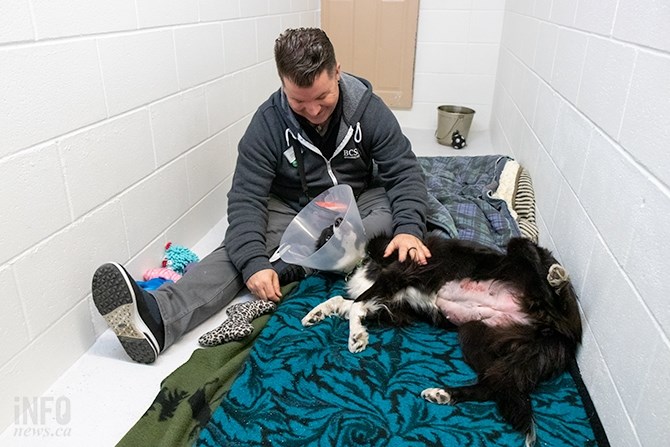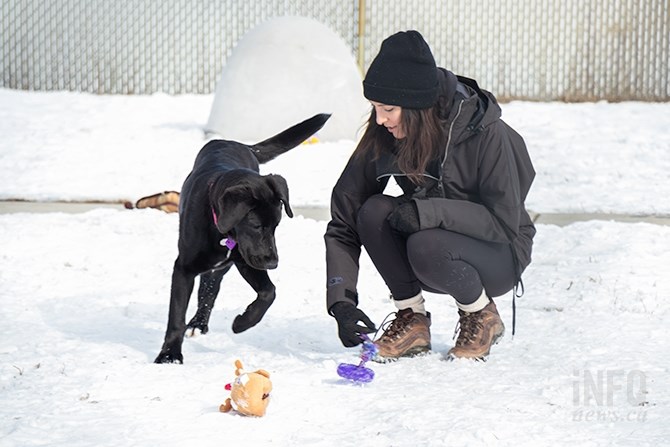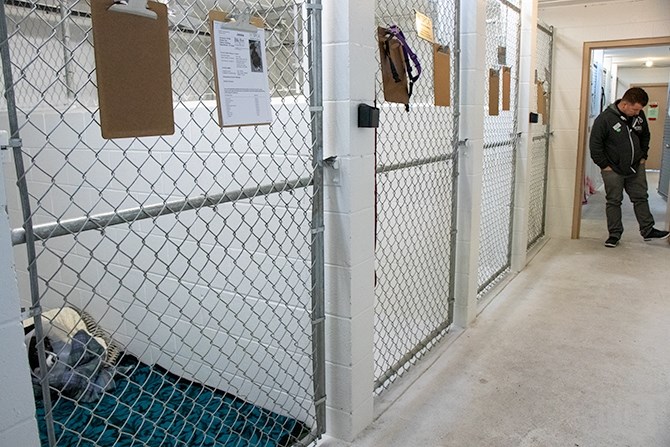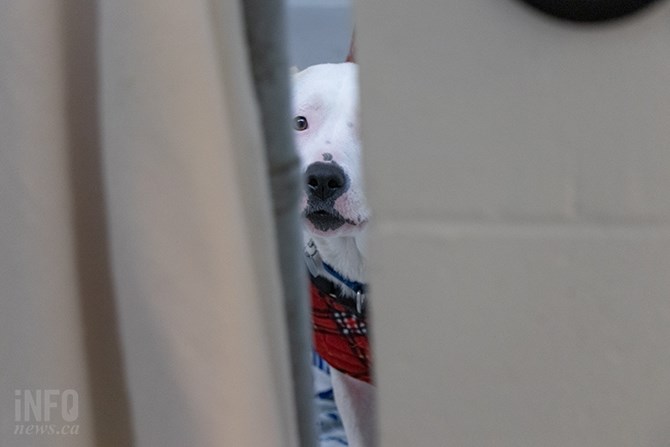
Sean Hogan gives belly rubs to Jessie, the female Border Collie who was recently spayed. Jessie was Global TV's 'Pet of the Week' on Feb. 25, 2019. She was adopted within 24 hours. The red patches of skin are razor burn from when her fur was shaved, and the cone on her head is to stop her from licking the incision.
(SHELBY THEVENOT / iNFOnews.ca)
March 12, 2019 - 2:39 PM
KELOWNA — The dog kennels at the Kelowna SPCA are white concrete walls echoing with gentle spa music to help soothe the animals. Branch manager Sean Hogan tries to keep the number of dogs down to no more than eight, so multiple enclosures are empty. Some days it is very quiet, others are more difficult.
The Central Okanagan shelter is the third busiest branch in the province, open seven days per week. They have a team of 200 volunteers and 12 staff, some are specially trained to help rehabilitate dogs after animal cruelty investigations. They start their days with a group meeting and then the shelter opens for business at noon.
Last year 1,330 animals came into their care, including hundreds of dogs quite often in need of medical or psychological rehabilitation.
"In the Interior we have a lot of expertise in dealing with dogs who need longer behaviour rehabilitation," Lorie Chortyk with the SPCA says in a phone interview. "So I know in this past year (2018) we’ve done a lot of large scale intakes of dogs from say like puppy mill situations where they’re incredibly fearful.”
Abused dogs are often not ready for adoption and it may take months of rehabilitation before they would be able to get rehomed.
However sometimes these animals cannot be rescued.

Carmen Facciotti, a Kelowna SPCA volunteer, socializes Olive, who was part of an 11-dog intake from Northern B.C. Some of the other dogs have gone on to different shelters around the province.
(SHELBY THEVENOT / iNFOnews.ca)
HARD TIMES
Euthanizing animals is a sensitive subject provoking strong public opinions.
"If we’re talking about a health rehabilitation—like a dog has cancer or something like that— I think people would be more comfortable with the answer that they would be euthanized," Hogan says. "When we’re talking about psychological distress that’s a little different."
To give an example on how animals suffer from mental distress, Hogan recalls a cruelty investigation from last year that lead to the seizure of about 60 dogs. They were brought to both the Kelowna and Penticton SPCA shelters. He says some of those animals could not be in any distance of people without experiencing a high level of fear.
"I mean like frozen, crapping the bed, that kind of fear, it’s horrible to watch," he says. "How could you ever answer the question of that being a fair situation for them?"
Time or space are not factors at play. There is no “time limit” on an animal’s rehabilitation and the SPCA shelters work together to ensure there is enough room to house all the animals.
Determining whether or not an animal will be euthanized is a consultative process between the staff, veterinarians on the case, as well as internal SPCA veterinarians.
Dr. Karen Van Haaften is an animal behaviour specialist for the B.C. SPCA. She works to help improve the psychological welfare of the animals so that they can be rehabilitated. One way is by prescribing medication, such as Trazodone for dogs, that is meant to help animals in conjunction with the shelter staff's efforts.
"The SPCA does support the use of anxiety-reducing medication for fearful animals that are undergoing behaviour modification programs in the shelter," Dr. Van Haaften says in an email. "We use this option primarily when an animal is experiencing a high level of anxiety which cannot be relieved using environmental management or behaviour modification alone."
Some dogs may not be ready to be adopted, but would still benefit from living in a home, so they may be available to go into foster care.

Sean Hogan gives belly rubs to Jessie, the female Border Collie who was recently spayed. Jessie was Global TV's 'Pet of the Week' on Feb. 25, 2019. She was adopted within 24 hours. The red patches of skin are razor burn from when her fur was shaved, and the cone on her head is to stop her from licking the incision.
(SHELBY THEVENOT / iNFOnews.ca)
HAPPY TALES
Fostering is a way the Kelowna SPCA expands the shelter to keep a lower number of dogs on site. Animals who may not be ready to be adopted yet stay in a temporary home.
Dogs may go into foster care because they are waiting on a medical procedure, or because they are still undergoing rehabilitation.
The foster program also helps the SPCA learn about how animals will do in a home.
Hogan fought back tears while telling a success story about a Shiba Inu named Copper, who went from cowering from people at the shelter to playing with a family pet in a foster home.
When Copper first came to the shelter she was fearful yet curious of people, and seemed to get along well with other dogs.
"You could watch the conflict in her. You could see it from 6-7 feet away," Hogan recalls. "She’d come toward you really curious she’d smell you from 12-18 inches away and then she’d run back to wherever she came from."
He says it took them weeks to manage the behaviour — and lots of chicken and cheese — but they still couldn't answer the question of how she would do in a home.
So she got matched up with a volunteer who had a Kelpie that got along well with Copper.
After her first weekend in the new foster home, the volunteer sent a video of Copper playing with the other dog. According to Hogan she looked like "a normal dog."
"It choked me up a bit because— you know, the work is tough and the staff work so hard — it’s hard when outcomes don’t go in our favour," he says. "So it was really rewarding this weekend to see this footage of Copper in a home."
Go here to learn more about fostering with the B.C. SPCA.
Go here to learn how to volunteer at a B.C. SPCA.

The dog kennels are quiet except for gentle spa music filling the white concrete halls on Feb. 15, 2019. Sean Hogan, the Kelowna SPCA branch manager, says with the staff they have he likes to keep no more than eight dogs at a time so that they can provide each animal with adequate care. "We’re limited on our staffing on our resources, if you’re in a situation—like we’re in right now— where you have three, four, five dogs that need behaviour modification plans— you can’t rush that stuff. At the same time you can’t have a bazillion animals in your care while you do that work."
(SHELBY THEVENOT / iNFOnews.ca)

Kona barks moments after kissing Sean Hogan's hand through the chain link door. A blanket is draped over her kennel, as the SPCA branch manager says she tends to bark when other dogs walk by. She is available for foster care while she waits to get spayed.
(SHELBY THEVENOT / iNFOnews.ca)

Sean Hogan, with the Kelowna SPCA, uses his phone to explain how to get notifications for when a pet matching the user's preferences comes available for adoption.
(SHELBY THEVENOT / iNFOnews.ca)
To contact a reporter for this story, email Shelby Thevenot or call (250) 819-6089 or email the editor You can also submit photos, videos or news tips to the newsroom and be entered to win a monthly prize draw.
We welcome your comments and opinions on our stories but play nice. We won’t censor or delete comments unless they contain off-topic statements or links, unnecessary vulgarity, false facts, spam or obviously fake profiles. If you have any concerns about what you see in comments, email the editor in the link above.
News from © iNFOnews, 2019